 Petzlover
PetzloverSumxu is originated from China but Tonkinese is originated from Canada. Both Sumxu and Tonkinese are having almost same weight. Sumxu may live 3 years less than Tonkinese. Both Sumxu and Tonkinese has same litter size. Sumxu requires Low Maintenance. But Tonkinese requires Moderate Maintenance
The Sumxu is an odd-looking cat with its droopy ears or drop-ears. The truth is, the cat is considered extinct and the last reported Chinese lop-eared cat was way back in 1938.
According to reports, the cat seems to have first made an appearance in 1656 and was always described as a curiosity. It seems as if they were valued as pets but they were also used as food. A Polish man was the first Westerner to describe the Sumxu in his illustrated book Flora Sinensis. The breed was once found in and around Peking and resembled a long-haired Scottish Fold.
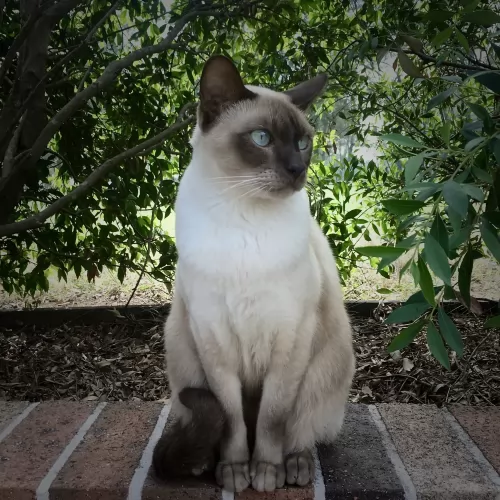 It was about in 1960 that a breeding program was established for these cats. The Tonkinese is a cat that hails from Canada and it was a certain Jane Batlett who was responsible for breeding this cat.
It was about in 1960 that a breeding program was established for these cats. The Tonkinese is a cat that hails from Canada and it was a certain Jane Batlett who was responsible for breeding this cat.
Also, Margaret Conroy, another breeder, set up her breeding program between a Burmese female with a Siamese. Both Conroy and Bartlett worked together on the breed and the Tonkinese came about. The Cat Fanciers Association recognized this cat breed in 1984.
The Chinese have always eaten this cat and because it has always been found in restrictive conditions the cat lost its keen sense of hearing because it no longer needed to hunt. The cat's ears lost their upright nature and became the hanging ears that are characteristic of the Chinese cat.
The cat had a long silky, shiny coat and was a dirty yellowy type of color. It had a ruff, a thick tail and blue, slanted eyes. It is thought that the size of the Sumxu was somewhat larger than the standard cat so he would have been a medium to large-sized cat, weighing in the region of 4 to 7kg. He was thick-set and muscular.
It is thought that this cat wasn’t particularly active and that it seems to only become really animated when offered food, preferring to lie beside a warm fire than to be found outside. We can only assume that it was a fairly quiet cat.
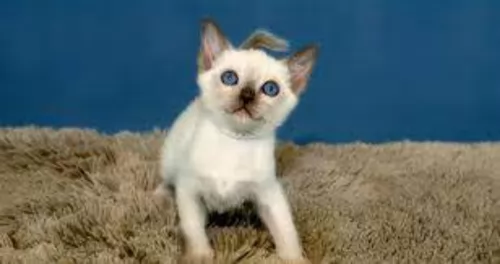 As a medium-sized cat, with a firm, muscular body, your Tonkinese will weigh between 2.5 – 6kg.The head is slightly rounded with fairly broad ears that are set wide apart.
As a medium-sized cat, with a firm, muscular body, your Tonkinese will weigh between 2.5 – 6kg.The head is slightly rounded with fairly broad ears that are set wide apart.
The eyes are bigger than the classic Oriental shape and can range from green to light blue in color.
The coat of the Tonkinese is short and close-lying and is soft and silky to touch. The mask, the ears, legs and tail are all darker than the body.
The Tonkinese cat breed is recognized by the Cat Fanciers' Association in 4 base colors - medium brown, champagne, blue and and platinum.
The Tonkinese cat, with one of its parents being the Siamese cat, just loves giving and receiving attention.
Active and social, he is an excellent choice for families with children and even other pets. They love just seeking out their human companions and lying down where they are.
They’re intelligent felines these, and you can even teach them some simple commands. Because of them being so very social, they don’t like to be left on their own – certainly not for the whole day while you go off to work.
Not much is known of the character of the Sumxu cat as it is now extinct. It doesn't matter what kind of cat you have because every cat needs to be loved and well cared for. If you can't do that, then why get a cat in the first place.
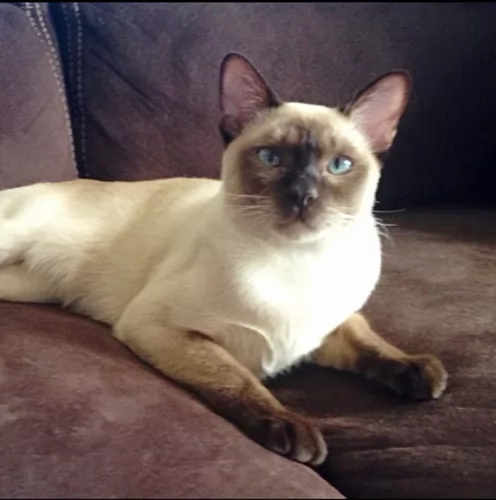 Tonkinese cats can be active and highly entertaining with their antics. When you laugh at them, they are encouraged to perform more.
Tonkinese cats can be active and highly entertaining with their antics. When you laugh at them, they are encouraged to perform more.
They are affectionate and intelligent cats and you will need to have toys for him. When he isn't playing, he likes nothing more than to be petted and pampered by his human family.
Your Tonkinese will get on well with children and other pets, and he generally makes a splendid pet for those who care well for him.
The Sumxu cat should have seen the veterinarian every year for an examination and to make sure his vaccinations and deworming were up to date.
It is never a good idea to give your cat medication that hasn't been prescribed by the vet. If the Sumxu cat had ingested a poisonous substance, it would have been kind to call the vet. It would have been dangerous for the Chinese to eat such a cat that had ingested poison.
While cats should be spayed and neutered, it is quite possible that the Sumxu cat was eaten before it ever had a chance to become a parent. Neutering and spaying a cat has health benefits for the cat and can prevent cancers.
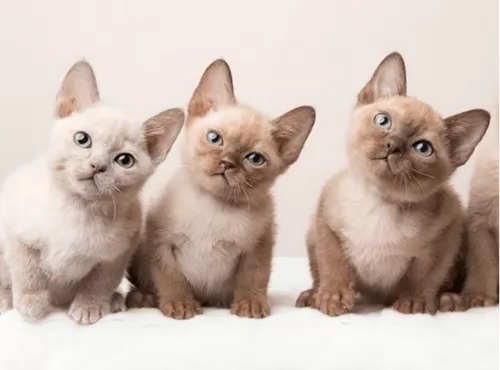 Tonkinese are generally healthy cats but they can be prone to eye problems such as gingvitis.
Tonkinese are generally healthy cats but they can be prone to eye problems such as gingvitis.
Because they are part of the Siamese family, they can succumb to some of the diseases that the Siamese battles with. These are asthma/bronchial disease, heart defects, lymphoma, and crossed eyes.
Lymphoma is linked with feline leukemia, a viral infection, and thankfully, more cats are being vaccinated for feline leukemia, so fortunately it is becoming less common.
Intestinal lymphoma affects the gastrointestinal tract and is the most common type of lymphoma in cats, being more common in older cats. Affected cats can suffer with weight loss, vomiting, and diarrhea. Get your cat to the vet as diagnosing this lymphoma will require the vet finding cancerous cells on microscopic examination.
One would have hoped that the now-extinct Sumxu cat received high-quality cat food. If you don't know what to feed your cat, your veterinarian will be able to advise you on the best diet. The cat food manufacturers always produce foods that take into account the cat's age and activity levels.
Certainly, every cat needs taurine, an essential amino acid, for heart and eye health. The food you choose for your cat should contain all the necessary vitamins and minerals.
You will need to provide fresh, cool water for your cat at all times. Wash and refill your cat’s water bowls regularly.
Take your pet to your vet for any signs of illness such as diarrhea, vomiting or lethargy.
The Sumxu cat would have required a brush every few days as the coat was long and silky. Brushing helps keep your cat's coat free of dust and loose hairs.
Your cat will need a litter box which should be placed in a quiet, accessible location. The Sumxu cat would not have liked feces in his litter box, and litter boxes of all cats should be kept clean.
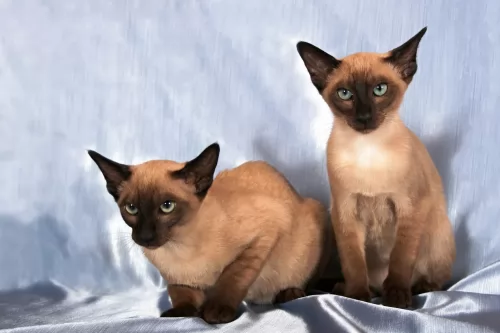 The Tonkinese has a short coat so a brush once a week will be sufficient for this cat as it just helps to brush away dust and loose hairs.
The Tonkinese has a short coat so a brush once a week will be sufficient for this cat as it just helps to brush away dust and loose hairs.
He will need a litter box and this will need to be kept spotlessly clean. Use a small rake, available from your vet or local pet shop, to rake up the cat’s feces.
When you first bring your Tonkinese cat home, you will at least need some of the basics to ensure his wellbeing. These are -
sleeping equipment – baskets or cushions in a nice warm, dry place for your cat.
A cat tree for climbing and a scratching post. Cats are natural scratchers so you can’t get angry with your cat for scratching. Instead, invest in a scratching post so that he doesn’t use your furniture to scratch on.
Food is such an important part of caring for a cat. The best type of cat food can ensure your cat has a strong immune system that allows him to not succumb to every cat sickness there is.
Cats are carnivores so ensure he has food high in meat. Sometimes it can be costly, but try to provide your cat with the best, most high-quality cat foods there are to ensure his good health and happiness.
A cat needs a constant supply of fresh, cool water night and day. The water should be changed regularly.